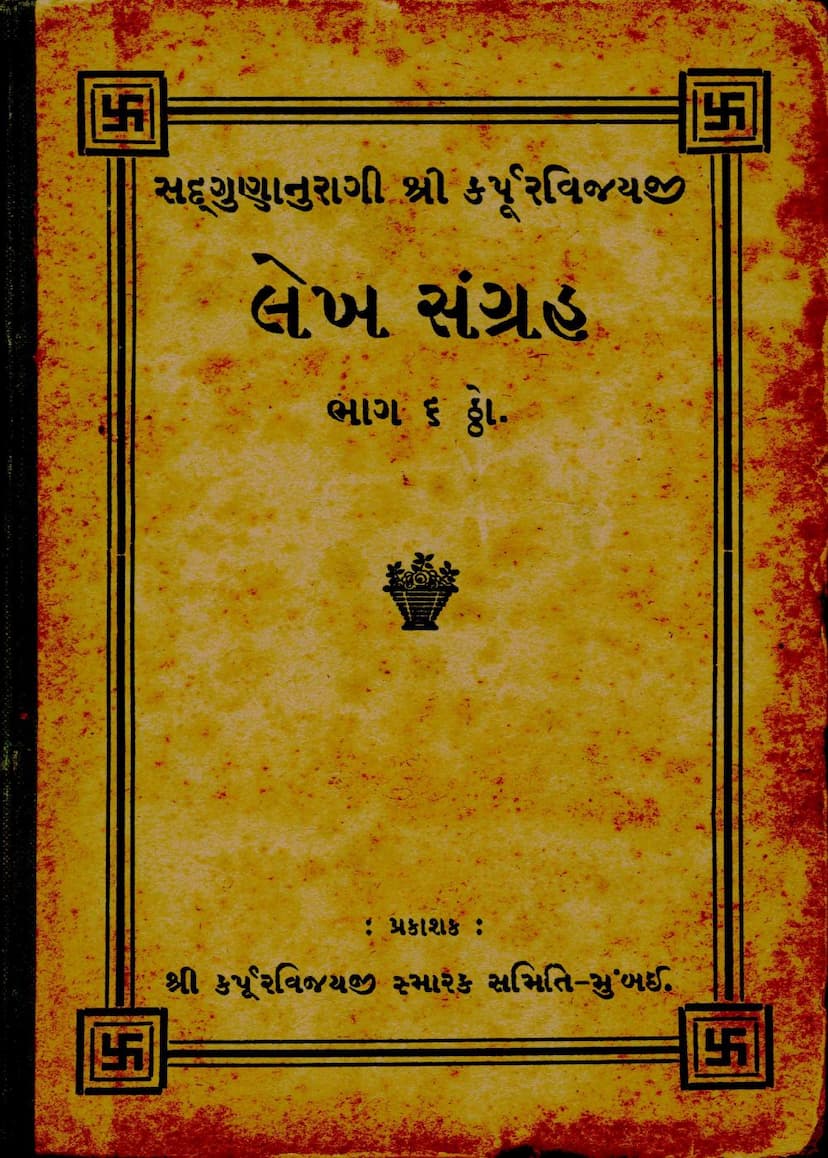Lekh Sangraha Part 06
Added to library: September 2, 2025
Loading image...

Summary
This document is the sixth volume of "Lekh Sangraha," compiled and published by the Shri Kapurvijay Smarak Samiti in Mumbai. It is dedicated to the memory of Muni Maharaj Shri Kapurvijayji, a virtuous and beloved Jain monk. The publication dates back to Vikram Samvat 1998 (AD 1942).
Key Contents and Themes:
- Dedication to Muni Shri Kapurvijayji: The book serves as a memorial to Muni Shri Kapurvijayji, highlighting his life and virtues. The introductory sections include a brief tribute to him, emphasizing his peaceful nature, compassion, his renunciation driven by knowledge and detachment rather than suffering, and his deep devotion to the Shatrunjaya Tirth. His passing is described as serene and befitting a true yogi.
- Inclusion of "Jnansar" by Yashovijayji Upadhyay: A significant portion of this volume is dedicated to "Jnansar," a work by the renowned Jain scholar Yashovijayji Upadhyay. It features 32 "Ashtakas" (octaves or sets of eight verses) composed by him in Sanskrit.
- Commentary and Translation: The volume includes:
- The original Sanskrit Ashtakas.
- Gujarati commentary (Bhāvārtha) handwritten by Yashovijayji Upadhyay himself.
- Word-for-word meaning (Shabdārtha) and detailed commentary (Vivechan) by Muni Kapurvijayji on specific Ashtakas.
- Thematic Focus of the Ashtakas: The "Jnansar" Ashtakas cover a wide range of profound Jain philosophical and spiritual concepts, including:
- Purnata (Completeness)
- Magnata (Absorption in knowledge)
- Sthirata (Steadfastness)
- Mohatyag (Renunciation of delusion)
- Jnana (Knowledge)
- Shama (Patience/Equanimity)
- Indriyajaya (Control of senses)
- Tyaga (Renunciation)
- Kriya (Action)
- Trupti (Contentment)
- Nilepa (Non-attachment)
- Nihspruha (Desirelessness)
- Mauna (Silence)
- Vidya (Spiritual knowledge)
- Viveka (Discernment)
- Madhyastha (Equanimity)
- Nirbhaya (Fearlessness)
- Anatmashansa (Non-self-praise)
- Tattvadrishti (Insight into reality)
- Sarvasamruddhi (All-encompassing prosperity)
- Karmavipaka (Consequences of karma)
- Bhoga (Enjoyment)
- Sanjna Tyaga (Abandonment of consciousness)
- Shastra (Scriptures)
- Parigraha (Possessions)
- Anubhava (Experience)
- Yoga (Spiritual discipline)
- Niyoga (Duty/Discipline)
- Puja (Worship)
- Dhyana (Meditation)
- Sarvanay (All viewpoints)
- Comparison with Other Commentaries: The text notes that while other commentaries on "Jnansar" exist, including one based on Gambhirvijayji Gani's Sanskrit commentary and Pandit Bhagwandas Harkchand Upadhyay's translation, this volume uniquely presents Muni Kapurvijayji's commentary alongside Yashovijayji's own commentary.
- Spiritual and Philosophical Depth: The "Jnansar" is described as the "quintessence of spiritual knowledge" (Jnansar, meaning essence of knowledge). Its verses aim to diminish worldly consciousness, awaken the soul, and reveal the path to spiritual liberation. The text emphasizes the importance of introspection and contemplation, comparing the study of these verses to the devotional study of the Bhagavad Gita.
- Universal Appeal: The style of writing is accessible to both Jain and non-Jain readers, and it uses terminology that resonates with Vedanta and Bhagavad Gita philosophies while remaining true to core Jain principles. It highlights the Jain tenet that the soul, even in its liberated state, remains full of its inherent qualities, contrasting this with certain Vedanta views on the dissolution of the soul into Brahman.
- Critique of Kapurvijayji's Life (from a specific perspective): The review section offers a personal perspective on Muni Kapurvijayji's life, suggesting that while his asceticism and sense-control were exemplary, a greater focus on comparative study of religions and sciences, particularly in English, might have benefited the Jain community by making Jain principles accessible to the educated class and bridging the gap between the learned and the faithful. It also points out a perceived lack of forceful action against certain "undesirable elements" within the Jain society and religion, suggesting that such issues require more than mere observation.
- Publishers and Supporters: The book is published by Shri Kapurvijayji Smarak Samiti, Mumbai, with acknowledgments to donors and contributors, including secretary Shri Nareottamdas Bhagwandas Shah and Panvinyas Shri Pritivijayji Ganivar.
In essence, "Lekh Sangraha Part 06" is a significant Jain religious and philosophical text, offering a deep dive into spiritual knowledge through the commentary and insights of Muni Kapurvijayji on the profound work of Yashovijayji Upadhyay, all dedicated to the revered memory of Muni Kapurvijayji.